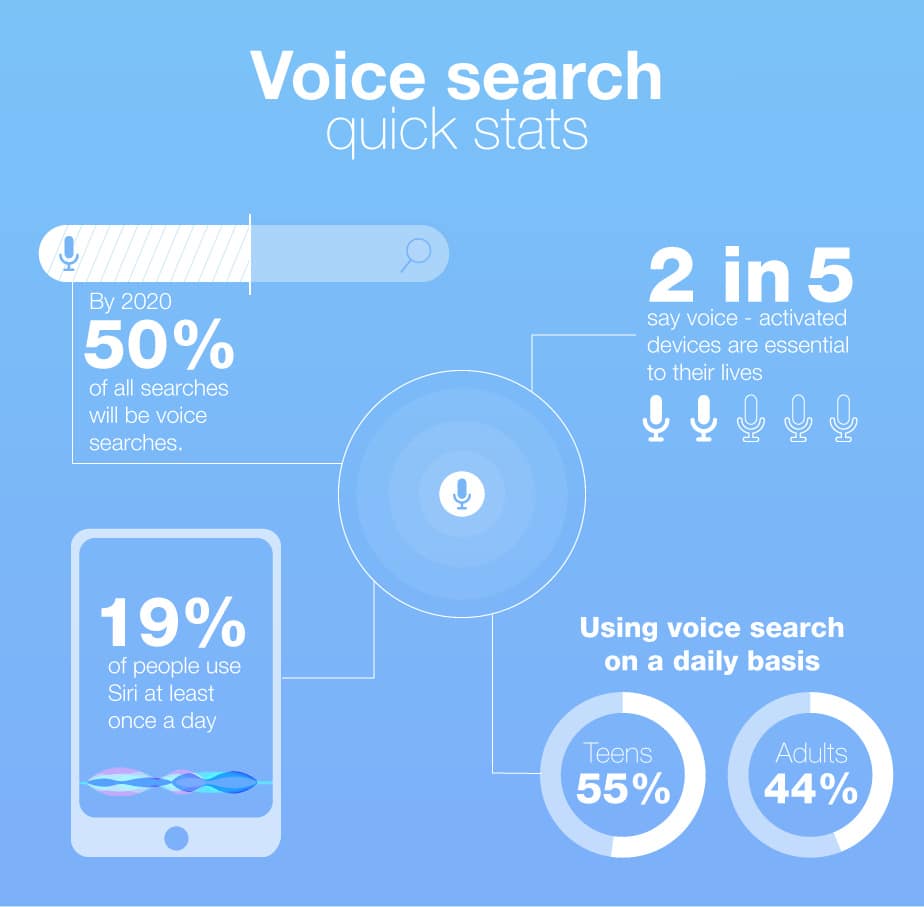Every year there are new technological developments that change the way businesses are run. Some are fads, but some cause a drastic and lasting change – Voice Search is one of those things.
Voice Search affected the way we use the internet, and it affected the Internet of Things. This is because while the change started with smartphones, it soon spread to other smart devices, like smart speakers, watches, and other various voice assistants worldwide. This is the voice search revolution.

Over 20% of searches of Google searches today come through Voice Search, Which is really not surprising, especially with the increase in the use of digital assistance. And because of this, it has had an impact on SEO which is why today we are discussing voice search optimization.
There are many SEO myths out there, therefore ensuring you are following the best voice search SEO tools and practices are paramount, regardless if you are a small emerging business or a large enterprise.
Why is Voice Search Increasing?
It’s quite clear to see why it is increasing, and why it is the future of search engine optimization.
Voice Search is Easier & Faster
Instead of having to type out your words like you would using the traditional search method, voice search is simply quicker and easier. It’s the main reason why people, especially teenagers, are adopting it.

Voice Search is More Convenient
In the digital world where efficiency and speed are key, voice search is the perfect solution. If you had to choose between speaking or typing, chances are you will choose to speak.

How Does Voice Search Differ From Traditional Search
Searching with your voice is far different than searching when you type. Here’s how.
Voice Search Keywords are Conversational and Longer
When using a computer or typing, shorter phrases are used since it requires less physical effort. Whereas with voice search, we ask the whole question and tend to converse more.
For example, a traditional search may be “best restaurants London”. When using voice search, we may ask “Hey Google, what are the best restaurants in London?”.
Local Listing Priority
Mobile searches for “things to do/activities” + “near me” have increased by 6x between 2016 and 2018. The increase in “x + near me” searches has increased across the board and this trend has not slowed down.
Voice Search Results Are Concise and Prompt
The results for voice searches are usually the featured snippets. Google is heavily reliant on knowledge graphs and rich snippets to answer voice search queries.
This is because voice searchers want quick and immediate results, something which Google understands and their results are optimized to provide searchers exactly what they want.

These results are usually read back to the searcher which helps with the instantaneous results.
Keyword Research for Voice Search
Now we have an idea of the different characteristics of voice search and how it works, it’s important we learn the keyword research process.
Some pointers to keep in mind when conducting keyword researching are:
- Question Keywords should be the focus. As mentioned before, voice search queries contain many question words – how, what, when, why where. Adding these into your keywords for voice search will be useful.
- Long-Tail Keywords are what complete a question and they are used a lot in voice search. You definitely shouldn’t ignore long-tail keywords when optimizing for voice searches.
- “Filler Words” are essential as they are always included in questions and are what make the queries more conversational. Filler word examples are “I, the, of the, on the, for, to” etc.
These points are critical in the success or failure of your voice keyword research. Your strategy should keep these points in mind in order to get better results and increase your ranking and boost your organic traffic.
Strategies to Optimize Your Content for Voice Search
As more and more people become aware of the importance of voice search, the competition will only get tougher. Therefore, enterprises and SEO developers should ensure that they have the optimal SEO strategy for voice search is a necessary practice.
These are some of the best voice search optimization strategies you can use to stay ahead of the game.
1. Optimize for Rich Answers
A study found that 70% of all answers returned from voice searches occupied a SERP feature – with 60% of those returning a Featured Snippet result. This number will not decrease, instead, it will most likely increase.
Google mostly displays rich answers to questions and this is shown in the steady rise of rich answer results.
2. Restructure Your Content
Since voice search is much more conversational than traditional searches, the content itself and its structure need to be analyzed. Ideally, you want your content to include concise questions and answers which will not only improve the layout but will also make it more voice search-friendly.
Knowing this, include a Frequently Asked Questions (FAQ) page on your product pages and blogs. Since they include question keywords and are fairly short, they will increase your chances to be ranked higher on Google.
The FAQ-style of the format will make it easier for Google to pull the necessary content from your website in order to display it as a rich snippet.
In addition to this, another good voice search practice is to use pointers to break your content into smaller fragments. This will also help with ranking.
3. Use Conversational Language
As mentioned previously, being conversational is one of the primary characteristics of a voice search query, and this needs to be leveraged. The more systematic and robotic the language in your content is, the less likely you will be to appear in voice search results.
When there is the use of natural conversational language, there is a lot of scope of matching as a result of verbal questions.
If you want to know how people are asking and phrasing their voice search queries, you need to understand the searcher’s intent. This is crucial. In order to do this, you must anticipate the query style that people use when engaging in voice search.
The questions you should be asking yourself are:
- What is their conversational style?
- What type of keywords are people using?
- What type of questions is being asked the most?
- What type of answers are best suited for these queries?
- Which answers are performing well and being displayed as voice search results?
Using data, with the answers to the questions above, will allow you to gauge what people are using voice search for and what they are looking for.
4. Improve Your Website Load Time
This one often goes unnoticed, even though it is essential and significant for voice search.
Websites that take longer to load have a higher bounce rate than those that load quickly, and therefore your website should be as fast and efficient as possible.
To further solidify the necessity of load time, the Speed Update by Google emphasizes optimizing website load times. As with traditional searchers, voice searchers need results immediately. So, if you have a slow website that takes too long to load, your website will not be chosen to answer verbal queries.
5. Long-Tail Keyword Phrases
As we have established, voice searches are longer due to their conversational style, and thus targeting long-tail keyword phrases is a must.
Additionally, we know that Google prefers long-form complete content. It would be difficult to prepare content separately for each and every voice search term, but we can definitely include all terms in a full post.
You can do this by developing long-form content which includes all the long-tail keywords that appear in vocal queries.

6. Focus on Mobile
Mobile phones easily beat other devices when it comes to voice search queries. This is because most verbal questions are being asked on a mobile phone and as a result, you should be prepared in order to deliver the best mobile user experience you can.
Adopting a mobile-first approach and creating mobile-friendly content is a major key. It’s not as easy as it seems, and there are a few steps you have to cover to accomplish that goal.
- Build a mobile-responsive website
- Optimize your website
- Ensure your website is crawlable to increase your content visibility and exposure
Mobile is the future of search and of course that includes vocal queries. Having a mobile responsive website is an SEO practice that is a necessity.
7. Leverage Google My Business Listings
Unfortunately, this strategy does not work if you are an eCommerce business, but as we already know, the number of people using voice searches for “near me” searches have been increasing. Whether you rank on those searches depends on your Google My Business listing.

To let Google know that your business is located at a specific place, you need to create a Google My Business listing. If someone asks Google to show similar businesses in your area, you want to ensure that you rank for that query.
Along with your business name, address, and phone number, choosing the correct business categories and providing area codes is vital.
If you don’t have a Google My Business listing yet, create one. Improve your local SEO and you will see positive results immediately.
Another great tool to rank for “near me” searches is to target local keywords to gain a higher search ranking.
Conclusion
The impact of voice search on SEO is certain. With each year passing by, it is on the rise and soon it will be everywhere. As a result, consumer behavior will also change and marketers have to be prepared for any trends in order to capitalize on them.
Tech giants such as Google, Microsoft, and Amazon have already optimized for voice search and you should be following suit. You do not want to be slow to catch up, and so specializing in voice search SEO is crucial if you want to compete.
The aforementioned strategies will help you rank better for voice search and will allow you to create a voice search SEO strategy that works. Now all that remains, is to implement them.


Comments are closed.